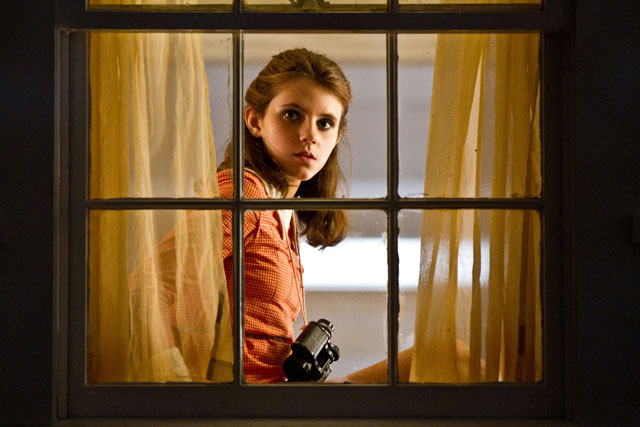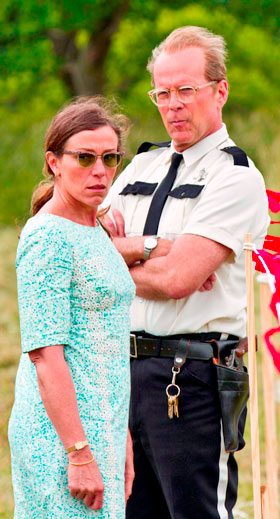Director Wes Anderson fusses over his films like a mother preparing a tousle-haired child for a photo. His movies are colour-coordinated, neatly buttoned-up, every small hair licked down into place, every quirky little detail — however inconsequential — arranged just so.
That’s all true of his latest film, Moonrise Kingdom, which is as fastidiously put together as anything else Anderson has done. Detractors say that this quality makes his films feel stilted, forced, not spontaneous. But look closely and you’ll find the untidiness of life bursting under Moonrise Kingdom‘s neat seams.
The film opens with the camera sweeping a cross-section of the troubled Bishop home, offsetting the domestic chaos with actors and props arranged as carefully as the furniture in a doll’s house. Parents Walt (Bill Murray) and Laura (Frances McDormand) lead quietly disaffected lives raising the wayward Suzy (Kara Hayward) and her three younger brothers on the (fictional) island of New Penzance.
Suzy, as we discover, has made a pact to run away with 12-year-old orphan Sam Shakusky (Jared Gilman), with whom she has corresponded by post since they met during a church concert the previous summer. The two misfits, who are misunderstood by adults and their peers, head for the wilderness where their young romance blossoms.
The adults of New Penzance have even bigger issues than the kids — and they’re all surfaced by the panic of the disappearance of Sam from his Khaki Scouts camp and Suzy from her home. Meanwhile, gathering storm clouds threaten to bring a Biblical flood to New Penzance, synchronous with the emotional upheaval.
Moonrise Kingdom is the debut feature for both Gilman and Hayward, who are as awkward as is natural for two kids in the thrall of a preadolescent romance. Sam and Suzy are lonely souls who find a connection in each other — a solemn boy with bottle-bottom specs, a girl whose bookish demeanor masks a violent temper.
The way they talk is precocious — they’re wise beyond their years, or maybe they’re living out pop-culture fantasies about life on the run in the way of the fugitive couples in Pierrot le Fou or Badlands. (“Was he a good dog?” asks Suzy when the scoutmaster’s pet meets a messy end. “Who’s to say? But he didn’t deserve to die,” replies Sam.)
If the children take on the speech and mannerisms of adults, the grownups are petty and emotionally stunted. They’re played by an ensemble of indie stalwarts and big-name actors, all eager enough to be in an Anderson film even if it means being upstaged by two inexperienced child actors.

Murray continues to perfect the sad-sack persona he has played in nearly every Wes Anderson movie to date, his disappointed weariness playing against the defeated sadness of the adulterous wife played by McDormand.
Bruce Willis as the “sad, dumb cop” with whom Laura has an affair turns in a tender and understated performance, while Edward Norton shines as the comically serious, chain-smoking scoutmaster. Tilda Swinton as the brusque, officious social worker intent on sending Sam to a youth refuge steals nearly every scene she’s in.
Moonrise Kingdom is nominally set in the New England of 1965, but its true place is the twilight between childhood and adolescence, its era those summer holidays that stretched out invitingly when you were a kid. It is infused with nostalgic warmth, carefully undercut by Anderson’s dry humour.

The mixture of adult cynicism and youthful hopefulness makes Moonrise Kingdom enchanting. It is a film that evokes the spirit of adventure that children find in fantasy novels, and counterpoints it with droll references to Titanic, The Shawshank Redemption and Vertigo.
Though I admire the technical perfection of Anderson’s earlier films, I never really connected with them, seeing their deliberate artifice as preciousness. Moonrise Kingdom has an emotional pull that I could not resist, even though Anderson is more himself than ever before.
His trademarks are all here — the symmetrical compositions, the flat planimetric shots, the esoteric music, the finicky art design — but they combine in an artful whole that feels as sincere as it is calculated. The film is so good that it is sending me straight back to Anderson’s earlier films wondering whether I was wrong about him all along.
It may be that the unhappy but basically optimistic child protagonists of Moonrise Kingdom are easier to like than the neurotic, self-obsessed adults of The Life Aquatic with Steve Zissou or The Darjeeling Limited. Perhaps it is the fact that this fable lends itself particularly well to Anderson’s fanciful style.
Or it could be the revelation that Anderson’s obsessiveness is not the affectation of his many imitators or the cold formalism of a Stanley Kubrick acolyte, but a neurotic impulse to bring order to the chaos of life.
Like any obsessive-compulsive, Anderson understands the messiness and impermanence of life well enough, and it scares the hell out of him. Under its mannered appearance, Moonrise Kingdom is a war between the fantasies of youth and the disillusion of adulthood.
That the film is so eloquent about both sides of the battle is what makes it a masterpiece. — © 2012 NewsCentral Media




